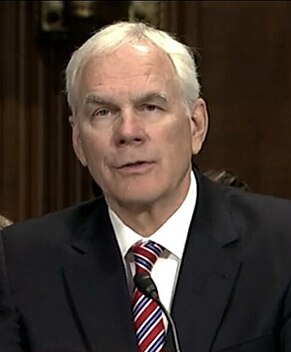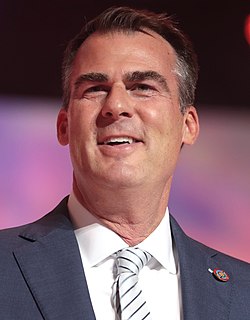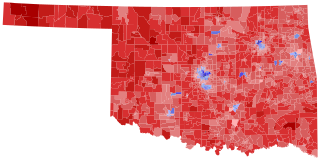
The Tulsa race massacre, also known as the Tulsa race riot or the Black Wall Street massacre, was a two-day-long massacre that took place between May 31 – June 1, 1921, when mobs of white residents, some of whom had been appointed as deputies and armed by city officials, attacked black residents and destroyed homes and businesses of the Greenwood District in Tulsa, Oklahoma. The event is considered one of "the single worst incident[s] of racial violence in American history" and has been described as one of the deadliest terrorist attacks in the history of the United States. The attackers burned and destroyed more than 35 square blocks of the neighborhood—at the time one of the wealthiest black communities in the United States, colloquially known as "Black Wall Street."

Mary Fallin is an American politician who served as the 27th governor of Oklahoma from 2011 to 2019. A member of the Republican Party, she was elected in 2010 and reelected in 2014. She was the first and so far only woman to be elected governor of Oklahoma. She was the first Oklahoma congresswoman since Alice Mary Robertson in 1920.
The Oklahoma Pardon and Parole Board is the parole board of the state of Oklahoma. The Board was created by an amendment to the Oklahoma Constitution in 1944. The Board has the authority to empower the Governor of Oklahoma to grant pardons, paroles, and commutations to people convicted of offenses against the state of Oklahoma.

The Fifty-fourth Oklahoma Legislature was the meeting of the legislative branch of the government of Oklahoma from January 8, 2013 to January 5, 2015. The first session met from February 4, 2013, to May 24, 2013, in the Oklahoma State Capitol in Oklahoma City, during the third year of the first administration of Governor Mary Fallin. After the 2012 elections, the Republican Party held more than two-thirds of the seats in the Oklahoma Senate and the Oklahoma House of Representatives.
Abortion in Oklahoma is illegal unless the abortion is necessary to save the life of a pregnant woman in a medical emergency, or the pregnancy resulted from an act of rape, sexual assault, or incest that has been reported to law enforcement. Even then, abortions in cases of rape, sexual assault, or incest are permitted only during the first six weeks of pregnancy, as a separate Oklahoma statute prohibits abortion after six weeks with no exceptions for rape or incest.

The 2018 Oklahoma gubernatorial election was held on November 6, 2018. Republican businessman Kevin Stitt was elected the 28th governor of the state, succeeding fellow Republican Mary Fallin, who was term-limited. Primary elections occurred on June 26, 2018, with primary runoff elections having occurred on August 28, 2018.

John Michael O'Connor is an American attorney and politician serving as the 19th attorney general of Oklahoma. O’Connor was previously a shareholder of Hall Estill and a nominee to be a United States district judge of the United States District Court for the Eastern District of Oklahoma, the United States District Court for the Northern District of Oklahoma, and the United States District Court for the Western District of Oklahoma.

John Kevin Stitt is an American businessman and politician serving as the 28th governor of Oklahoma. A member of the Republican Party, he began his first term as governor in January 2019 and was reelected to a second term in 2022. As a member of the Cherokee Nation, Stitt is the second governor of Native descent after former Oklahoma governor Johnston Murray.

Terry O'Donnell is an American politician and a member of the Republican Party who has served as the Oklahoma House Representative for the 23rd district since January 8, 2013. He first won elected office in the 2012 Oklahoma state elections. In January 2021, O'Donnell was promoted to be the speaker pro tempore of the Oklahoma House of Representatives, the second highest ranking Republican Party of Oklahoma member in the state house. On December 17, 2021, O'Donnell was indicted in relation to a Tag Agency corruption scandal. He resigned as speaker pro tempore on February 2, 2022.

The Fifty-seventh Oklahoma Legislature was a meeting of the legislative branch of the government of Oklahoma, composed of the Senate and the House of Representatives. It met in Oklahoma City, Oklahoma from January 3, 2019, to January 3, 2021, during the first two years of the first administration of Governor Kevin Stitt. The November 2018 elections maintained Republican control of both the House and Senate.
This is a list of protests in Oklahoma related to the murder of George Floyd.

Sean Roberts is a Republican member of the Oklahoma House of Representatives, currently serving the 36th District of Oklahoma. He first assumed office in 2011 and is term limited from running for reelection in 2022.

The 2022 Oklahoma gubernatorial election was held on November 8, 2022, to elect the governor of Oklahoma. The primary elections for the Republican and Democratic parties' nominations took place on June 28, 2022. The deadline for candidates to file was April 15, 2022.

Oklahoma Question 802, the Oklahoma Medicaid Expansion Initiative, was a 2020 ballot measure on the June 30 ballot to expand Medicaid in the state of Oklahoma. It passed narrowly, over the objections of many prominent state elected officials, such as Oklahoma's governor Kevin Stitt. Medicaid expansion went into effect on July 1, 2021.

The 2022 Oklahoma Senate general election will be held on November 8, 2022. The primary elections for the Republican, Democratic, and Libertarian parties' nominations took place on June 28, 2022. Runoff primary elections, if no candidate received 50% in the June 28 vote, took place on August 23. All candidates had to file between the days of April 13–15, 2022. Oklahoma voters will elect state senators in 24 of the state's 48 Senate districts. State senators serve four-year terms in the Oklahoma Senate.

The Fifty-eighth Oklahoma Legislature is the current meeting of the legislative branch of the government of Oklahoma, composed of the Senate and the House of Representatives. It meets in Oklahoma City, Oklahoma from January 3, 2021, to January 3, 2023, during the second two years of the first administration of Governor Kevin Stitt. The 2020 Oklahoma elections maintained Republican control of both the House and Senate.

A general election was held in the state of Oklahoma on Tuesday, November 8, 2022. The primary election was held on Tuesday, June 28, 2022. Runoff primary elections, where necessary, were held on Tuesday, August 23. The candidate filing period was April 13, 2022 to April 15, 2022.
Steve Kunzweiler is the current Tulsa County District Attorney. He has worked on shows for the Forensic Files, See No Evil and 60 Minutes.
David Prater is the current Oklahoma County, District 7, District Attorney.

The 2022 Oklahoma Attorney General election took place on November 8, 2022, to elect the Attorney General of Oklahoma. The primary election was scheduled for Tuesday, June 28, 2022. The candidate filing deadline was April 15, 2022.













